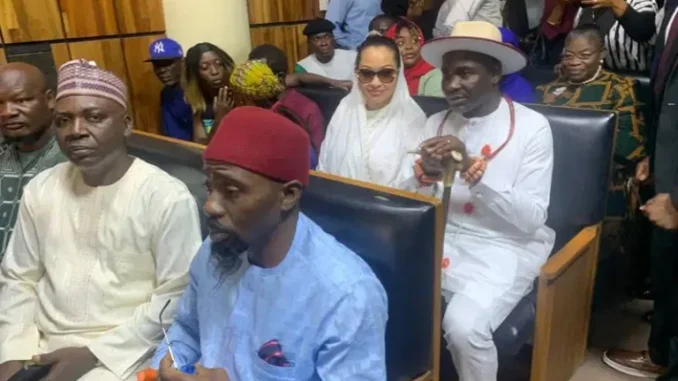
By Divine Sam
The Federal High Court in Abuja has postponed the trial of Senator Natasha Akpoti-Uduaghan, representing Kogi North, on charges related to cybercrime. The trial, which was scheduled to begin on Monday, October 21, was adjourned to November 24 due to the absence of the presiding judge, Justice Mohammed Umar.
Justice Umar was reportedly unavailable because of a protest led by activist Omoyele Sowore, demanding the release of Nnamdi Kanu, the detained leader of the proscribed Indigenous People of Biafra (IPOB). As a result, the courtroom was locked, and judicial proceedings were disrupted.
Court activities resumed the following day, and the new trial date was set.
Senator Natasha is facing a six-count charge filed by the Director of Public Prosecution of the Federation, Mohammed Abubakar. The charges stem from alleged transmission of false and damaging information through electronic means, purportedly aimed at inciting violence and endangering lives.
She was initially arraigned on June 30, 2025, and granted bail. Her trial was supposed to begin on September 22, but it was stalled due to a preliminary objection raised by her legal team, led by Senior Advocate of Nigeria (SAN), Ehiogie West-Idahosa.
At that time, the defence argued that the court lacked jurisdiction, not based on the content of the charges but due to what it described as an abuse of prosecutorial powers by the Attorney General of the Federation. The defence also claimed it had not been provided with statements from the prosecution’s witnesses.
Although the prosecution, represented by David Kaswe, was ready to begin its case and had already set up a television screen for presentation, the judge ruled that the objection must first be addressed.
The core of the allegation involves public statements made by Senator Natasha on April 4 in Ihima, Kogi State, and during a television interview, where she reportedly accused Senate President Godswill Akpabio and former Kogi Governor Yahaya Bello of plotting to assassinate her.
The case is being prosecuted under the Cybercrimes (Prohibition, Prevention, etc.) (Amendment) Act, 2024.